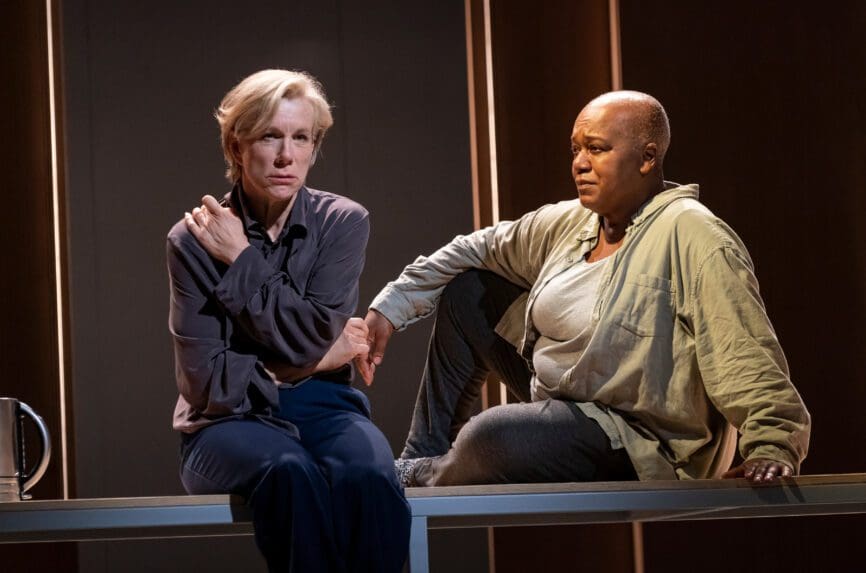Bioethics Forum Essay
The Drama of Medical Ethics: A New Play
In the waning years of the Austro-Hungarian Empire, Arthur Schnitzler, the physician and writer, wrote his most controversial play, “Professor Bernhardi.” Unlike his fin-de-siècle Viennese contemporaries, such as Sigmund Freud, Ludwig Wittgenstein, Gustav Klimt, and Gustav Mahler, Schnitzler is hardly a household name. Yet, Freud called Schnitzler his doppelgänger for having found through intuition what Freud had discovered only through years of research – the unconscious. Max Ophϋls’s classic 1950 film “La Ronde”(about venereal disease spreading through all levels of Vienna’s society), Stanley Kubrick’s “Eyes WideShut,” and Tom Stoppard’s “Dalliance” are all based on Schnitzler’s work.
Written in 1912, “Professor Bernhardi” was banned by the Austrian Parliament and performed in Schnitzler’s native Vienna only after the Empire had collapsed following World War I. Alas, the play has rarely been seen since – performed in New York only twice – in 1918, in German, and briefly in 1968, at the City Center in English.
Luckily, in 2019, London’s Almeida Theater staged a production of a new play, loosely adapted from Schnitzler’s, which garnered several prestigious awards and recently came to the Park Avenue Armory in New York City, where it is now being performed until August 19.
This adaptation, entitled “The Doctor,” powerfully dramatizes many controversial issues of medical ethics, along with what is now termed “identity politics.” New plays rarely address medical ethics issues in any serious way, but these productions are important because they can heighten awareness of these topics among broader audiences.
In Schnitzler’s original play, a priest wants to administer last rites to a patient who is dying from sepsis that resulted from a botched abortion. The patient does not know she is dying, and a Jewish doctor refuses to allow the priest access to the patient, saying that last rites would upset her. The priest launches a public campaign against the Jewish doctor, who is ultimately jailed for two months and loses his license. At the time in Vienna, antisemitism was rife and rising, and play’s political overtones stirred debate.
In the new adaptation, written and directed by Robert Icke (the youngest person ever to win Great Britain’s Olivier Award for Best Director), a 14-year-old girl is dying of sepsis from a botched abortion she attempted at home. Her mental status is unclear, as she has expressed delusions.
A man dressed in black enters, saying that he is a priest and that the girl’s parents asked him to come to give last rites. The hospital director, Dr. Ruth Wolff, refuses to allow him to enter the room, arguing that the girl is conscious but delusional and would be upset by the priest giving last rites – i.e., informing her that she is dying. Wolff argues that it is not clear that he is really a priest, or that he was really sent by the girl’s parents, or that the girl (though she wears a cross) wants to see a priest. A screaming match ensues, during which the physician hits the priest.
He then complains and a massive social media campaign ensues, criticizing her. Medical staff and the hospital public relations director urge her to issue a public statement, apologizing or explaining what happened, but she refuses, insisting that she did nothing wrong.
The hospital is simultaneously working to raise several million dollars for a new building, and donors become leery. Three board members resign, and the hospital staff battle about what to do, given that the institution’s future is now at stake. Wolff remains arrogant, convinced she is right, and shuts down debate at staff meetings.
In the midst of these arguments, the girl’s father wanders in and angrily denounces the staff for having “killed my baby girl,” whom, he cries, will now go to hell because she was not given last rites, a chance to ask forgiveness. He accuses the hospital of caring more about itself than about its patients. A Catholic doctor then makes a motion to the medical staff for a vote of no confidence. Wolff, superbly played by Juliet Stevenson, one of The U.K.’s best actresses and an Olivier Award winner, instead resigns.
A few days later, Wolff appears on a television program, grilled by a panel that includes an anti-abortion advocate and a post-colonial studies scholar, all of whom attack her. We then learn that the priest, though played by a white actor, John Mackay, is in fact black, raising issues concerning racial bias. The panelists accuse her of hiring whites and Jews, instead of people from other groups. Wolff responds that she always seeks to hire the best possible candidates. In the course of defending herself, she explains that she is open-minded and is, in fact, friends with a transgender adolescent who comes by her house to do homework.
Given the public outcry, the government launches an investigation and removes Wolff’s medical license. The transgender youth accuses Wolff of having outed them to their parents without their permission.
In the end, the priest visits Wolff, who comes to realize the need for medical humility and the fact that medicine and faith are each important in their own ways. She sees, too, that she could have asked the dying girl whether she wanted to see the priest.
Vividly dramatized, these scenes make the audience feel and experience the pain of these conflicts among medical staff, patients, patients’ families, hospital administrators, clergy, the government, and others. The play powerfully illustrates how doctoring involves more than science, but also requires sensitivity and communication. In today’s world of multibillion-dollar budgets and social media, a hospital director needs to hear and be sensitive to multiple voices and constituents.
The crisp and fast-paced script contains wonderful lines. One doctor comments that in hospitals “development” used to refer to human growth, not raising funds, and that he thought that patients who were “donors” referred to organ donors, not those who gave money.
The production is valuable in showing how key bioethical issues can be dramatically and potently presented to a broad audience, transporting us, and enabling us to see situations through others’ eyes. The more such issues are conveyed to the wider public, including providers, patients, clergy, and government officials, the more sensitive to biases and false assumptions, we all will be.
Robert Klitzman, MD, is professor of psychiatry and director of the masters of bioethics program at Columbia University, a Hastings Center fellow, and the author of When Doctors Become Patients.
[Photo: Juliet Stevenson and Juliet Garricks in “The Doctor,” Park Avenue Armory, 2023. Photo credit: Stephanie Berger Photography/Park Avenue Armory]













How evocative! Thank you for this….
So let me see if I understand: in the new, improved, socially-conscious version of the play, the Jewish character is an arrogant racist who harms both a Catholic and a trans kid, but finds her redemption in an encounter with a priest, who shows her a better spiritual and moral path.
New and updated indeed: now with more and better Jewish stereotypes, plus supersessionism !
Plus ça change . . . .
This was an incredibly thought-provoking play. I left there contemplating if my own actions with a patient had ever been so blindly led by self-preservation, arrogance, and deep-rooted trauma. For me It put the spotlight on the growing bioethical dilemma of doing no harm and what that can look like in a changing healthcare system. For decades society has adhered to the idea that the doctors’ understanding of a patient’s condition was all inclusive when they made a treatment decision. That all external influences and personal biases had been removed for the greater good of the patient. What we failed to see is that it is impossible. As providers we must be cognizant that at our very foundation are unconscious biases, preexisting traumas, and a drive for self-preservation.
All these foundational pieces affect how we believe our actions are just and best for the individuals we care for. The misalignment of an individual’s values, spiritual beliefs, or cultural settings to that of our own is when we inherently provide unethical care. Ethical care is more than providing the correct medication or procedure to someone that is ill. It is about understanding and respecting what a patient wants, even when it goes against what we believe is right. When there is a misalignment that is the time for a provider to have an open conversation with the patient and family as well as self-reflect to ensure that we are not causing undue harm in the name of medicine or to ease our own conscious.
The relevancy of topics incorporated in this version of the play are ones that have existed for decades and will continue to exist in our world. They are as individual and unique as one person is to the next and is the reason there cannot be a single answer on how to deal with them as providers, and more importantly why self-reflection must happen. Discussions about patient values and goals along with self -reflection may seem simple and out of place in the world of medicine, but that is exactly where they belong. Incorporation of these components as standards of care has been absent in medicine for far too long and this play brought it front and center.
The medical community can read and discuss ethical scenarios at length in academia, but watching it develop in front of you and seeing the emotions and struggles of everyone involved provides an understanding that cannot be taught. Such understanding begins to rework the foundation that is the basis of our care and ethical decisions. I feel this play should be viewed by all who are entering medicine.